高中英语选修7 Unit4教案
2020版高考英语一轮复习Unit4Civilization教案(含解析)重庆大学版选修7

Unit 4 Civilization一、单词——在语境中默写,在联想中积累写得准用得活(用所给词的适当形式填空)1.acquire vt.学习,习得;获得2.superior adj.更好的;占优势的;更胜一筹的3.alternative n. 选择adj. 替代的4.approach vt.接近;动手处理n. 途径,方法,接近5.print vt.印刷;冲洗(照片)n. 字体;印刷6.practical adj.实用的;(切合)实际的,有实用价值的→practice n.实践7.existence n.存在,生存→exist vi.存在,生存8.violent adj.暴力的,粗暴的;强烈的→violently adv.猛烈地→violence n.暴力;暴行;猛烈9.succeed vi.成功;接着发生;继承→succeeding adj.后继的,随后的→success n.成功;成功的人或事→successful adj.成功的10.intelligent adj.聪明的,有头脑的→intelligence n.智力,理解力pare vt.(to, with)比较;(to)把……比作vi.相比→comparable adj.可比较的;适合相比的12.option n.选择权;可选物;选课→optional adj.可以任选的,非强制的13.disadvantage n.不利(条件);损失;缺点;劣势→disadvantageous adj.不利的→advantage n.优点;优势14.evaluate vt.评估,评价→evaluation n.估价,1.Success in almost any field depends more on energy and drive than it does on intelligence (intelligent).2.Practical experience is often very important and practice is the direct way to get experience.(practice)3.He succeeded his father as manager of the company.Soon their business became very successful.(succeed)4.The advantage of cycling to work is that we can live a lowcarbon life while the disadvantage is that it wastes time.(advantage)st night we had a discussion, which became more and more violent.Finally we reached an agreement that we will never use violence whatever happens.(violent)6.As people are curious about the existence of the Alien, the discussion of whether the UFO exists or not never has a stop.(exist)评价15.resulting adj.结果的→result n.结果;成绩,比分vi.导致;起因于7.This course is optional,_which means you have an option to decide whether to choose it or not.(option)1.acquire同义词一览①get 得到②gain 赢得,获得③obtain 获得④win 取得,赢得⑤earn 获得,赚得2.“选择”家族①alternative 选择②choice 选择;选择权③option 选择权;可选物④selection 选择,挑选3.“聪明”有几何?①intelligent adj.聪明的②clever adj.聪明的③smart adj.机灵的④bright adj.聪明的⑤wise adj.英明的4.后缀age名词集锦①advantage 优势②percentage 百分比③postage 邮资④message信息⑤usage 使用5.ence结尾名词知多少①existence存在②dependence 依靠③innocence 无罪,天真④intelligence 智力⑤diligence 勤奋,勤勉⑥violence 暴力二、短语——在应用中记牢,在归纳中记多写得准用得活(选用左栏短语填空)1.apart_from_... 除……以外(还)2.no_doubt 毫无疑问3.in_this_respect 就这方面而言4.side_by_side 肩并肩地5.in_the_end 最后,最终6.become_accustomed_to 习惯于7.mean_to_... 打算;意指 8.in_general 大体上;通常9.provide_...with 为某人提供……10.in_particular 尤其;特别是11.be_exposed_to 使遭受;接触,经历12.cope_with 应付;处理1.I’m sure she’ll cope_with the changes very well —she’s very adaptable.2.I am interested in stories in_general,_and in detective stories in particular.3.This means that after a while your bodybecomes_accustomed_to having nicotine in it.13.cut_into 把……切成……14.be_necessary_for对……是必需的,对……是必不可少的15.be_used_for 用于16.so_far 迄今为止,到目前为止17.in_the_development_of 在……的发展中18.the_number_of_... ……的数量(是)19.neither_of_... (两者)都不20.have_the_confidence_to 有信心做……21.fail_to_do_sth. 没能够做;做……不成功22.a_range_of 各种各样的;一系列4.Apart_from a couple of spelling mistakes, this is an excellent piece of work.5.Children, when they are_exposed_to an Englishspeaking atmosphere, will pick up the language much more easily.6.The_number_of homeless people has increased dramatically.1.“no+n.”短语小结①no doubt毫无疑问②no problem 没问题③no wonder 难怪④no way 决不⑤no comment 无可奉告⑥no trouble 不麻烦2.“n.+prep.+n.”短语荟萃①side by side肩并肩地②step by step 逐步地③face to face 面对面地④heart to heart 心连心地⑤shoulder to shoulder 肩并肩地⑥hand in hand 手拉手地⑦arm in arm 手挽手地三、句式——在解读中学懂,在仿写中学通背原句明句式学仿写1.Our ancestors did manage to write without paper. 我们的祖先在没有纸的情况下确实能书写。
人教版高中英语选修7Unit4教案1
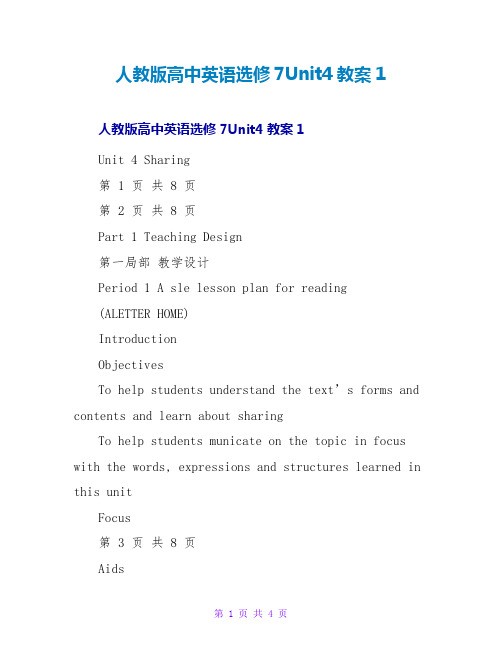
人教版高中英语选修7Unit4教案1人教版高中英语选修7Unit4教案1Unit 4 Sharing第 1 页共 8 页第 2 页共 8 页Part 1 Teaching Design第一局部教学设计Period 1 A sle lesson plan for reading(ALETTER HOME)IntroductionObjectivesTo help students understand the text’s forms and contents and learn about sharingTo help students municate on the topic in focus with the words, expressions and structures learned in this unitFocus第 3 页共 8 页AidsMultimedia facilities, tape-recorder, photos, diagramsProcedures1. Warming up by defining volunteerHello, class. Have you ever taken part in any volunteer work? No? Then wele to our school volunteer work group. But first what is a volunteer? A volunteer is:* One who enters into, or offers for, any service of his own free will.* (Mil.) One who enters into service voluntarily, but who, when in service, is subject to discipline and regulations like other soldiers; -- opposed to conscript; specifically, a voluntary member of the organized militia of a country as distinguished from the standing army.2. Pre-reading by getting to know about a place called Papua New GuineaHave you ever heard of a place called Papua New Guinea? Now read the fact sheet and the map.第 4 页共 8 页3. Reading for forms It is unlikely that you will understand 100 percent of the vocabulary in the text, especially at a first reading. Use first the context and then your own knowledge of the subject to help you guess the meaning of unknown words.Read the text to: cut/ the sentence into thought groups, blacken the predicates, darken the4. Copying collocationsA collocation is two or more words that often go together. These binations just soundWhile going over the text, try to recognize the collocations, treat them as single blocks of language and copy them out into your Collocation Book.第 5 页共 8 页5. Writing a letter of your own.Now you are to write a similar letter based on the topic, the words and the structures of the letter on page 29.第 6 页共 8 页6. Reading the text once again for the type of writing and the structure of A LETTER HOMEMost articles and their paragraphs have a three-part structure—introduction, body, and conclusion. You can see this structure in our texts whether they are narrating, describing, paring,contrasting, or analyzing information. Each partof the article or paragraph plays an important role in municating our meaning to our reader.Now read the text once again for the type of writing and the structure of A LETTER HOME7. Closing down by reading more on voluntary work第 7 页共 8 页第 8 页共 8 页。
高中选修7 Unit 4 Sharing 第一课时教案
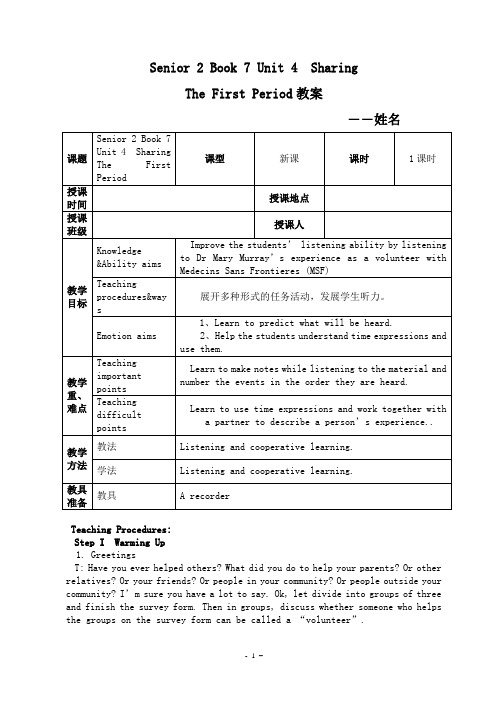
Senior 2 Book 7 Unit 4 SharingThe First Period教案――姓名Teaching Procedures:Step I Warming Up1. GreetingsT: Have you ever helped others? What did you do to help your parents? Or other relatives? Or your friends? Or people in your community? Or people outside your community? I’m sure you have a lot to say. Ok, let divide into groups of three and finish the survey form. Then in groups, discuss whether someone who helps the groups on the survey form can be called a “volunteer”.Step II Listening(I)(The teacher plays the tape and the students listen to it.)T: Now let’s check the answers of Exercis e 1 and 2.(The students will answer the questions)T: Now let’s listen to the dialogue for a second time. When you are listening, you can check the answers of Exercise 2 and finish Exercises 3 and 4. Learn to make notes about Mary’s experiences in the ta ble on Page 35. And share your notes with your partner and then with other groups.(The students will makes notes, and share their notes.)T: Ok, let’s listen to it for a third time to check the notes.Step III Listening(II)T: Perhaps you may wonder, because we are students, what we can do to help. That is, what can we do to serve communities outside the school? Ok, let do LISTENING in the workbook on Page 70. You are also required to predict what you will hear, according to the four questions.Step V AssignmentT: Boys and girls, today we have listened to two materials about giving help to others. I do hope all of us will help those who need help. Besides, you should learn to predict what you will hear before listening and pay attention to the time expressions while listening.Step VI Homework1. Finish the LISTENING TASK on Page 75-76. Remember to predict what you will hear according to the given information and also pay attention to time expressions.2. Google for more information about MSF and share it between us.。
人教版高中英语选修7《Unit 4 Sharing Reading A letter home》教学设计
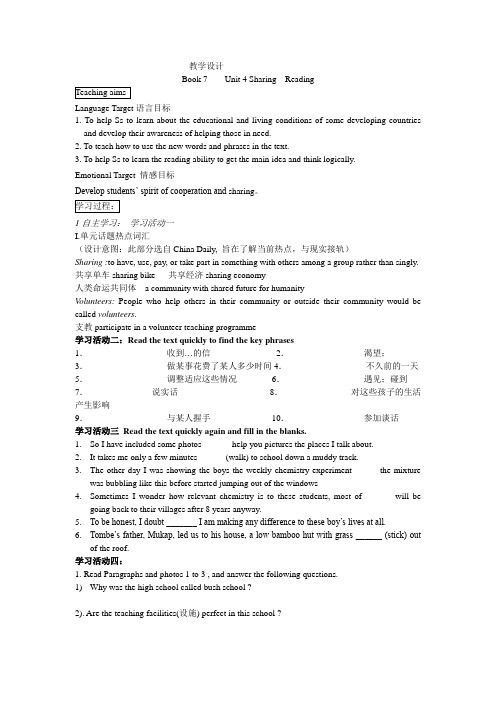
教学设计Book 7 Unit 4 Sharing ReadingLanguage Target语言目标1. To help Ss to learn about the educational and living conditions of some developing countries and develop their awareness of helping those in need.2. To teach how to use the new words and phrases in the text.3. To help Ss to learn the reading ability to get the main idea and think logically.Emotional Target 情感目标Develop students’ spirit of cooperation and sharing。
1自主学习:学习活动一I.单元话题热点词汇(设计意图:此部分选自China Daily, 旨在了解当前热点,与现实接轨)Sharing :to have, use, pay, or take part in something with others among a group rather than singly. 共享单车sharing bike 共享经济sharing economy人类命运共同体 a community with shared future for humanityVolunteers:People who help others in their community or outside their community would be called volunteers.支教participate in a volunteer teaching programme学习活动二:Read the text quickly to find the key phrases1.________________收到…的信2.________________ 渴望;3.________________ 做某事花费了某人多少时间4.________________ 不久前的一天5.________________ 调整适应这些情况6.________________ 遇见;碰到7._____________ 说实话8.________________对这些孩子的生活产生影响9.________________ 与某人握手10.________________ 参加谈话学习活动三Read the text quickly again and fill in the blanks.1.So I have included some photos ______ help you pictures the places I talk about.2.It takes me only a few minutes ______(walk) to school down a muddy track.3.The other day I was showing the boys the weekly chemistry experiment _____ the mixturewas bubbling like this before started jumping out of the windows4.Sometimes I wonder how relevant chemistry is to these students, most of ______ will begoing back to their villages after 8 years anyway.5.To be honest, I doubt _______ I am making any difference to these boy’s lives at all.6.Tombe’s father, Mukap, led us to his house, a low bamboo hut with grass ______ (stick) outof the roof.学习活动四:1. Read Paragraphs and photos 1 to 3 , and answer the following questions.1)Why was the high school called bush school ?____________________________________________________________________2). Are the teaching facilities(设施) perfect in this school ?_____________________________________________________________________3). Why was science the most challenging subject for Job ?4). Why did the boys started jumping out of the windows ?____________________________________________________________________________3.Read Paragraphs 7-9 and choose the best answer.1. Why did Tombe throw out the tin can?A. Because he believed the can attracted evil spirits.B. Because he believed any leftovers attracted evil spirits.C. Because he believed the can has no use at all.D. Because he believed the grill attracted evil spirits.2. How did Jo feel after the visit to Tombe’s family?A. Happy.B. Sad.C. Worried.D. Upset.学习活动五:According to the details above, try to find out the main idea of the letter.The main idea:。
译林版高中英语选修7学案 Unit4 Publictransport SectionⅠ Word版含解析
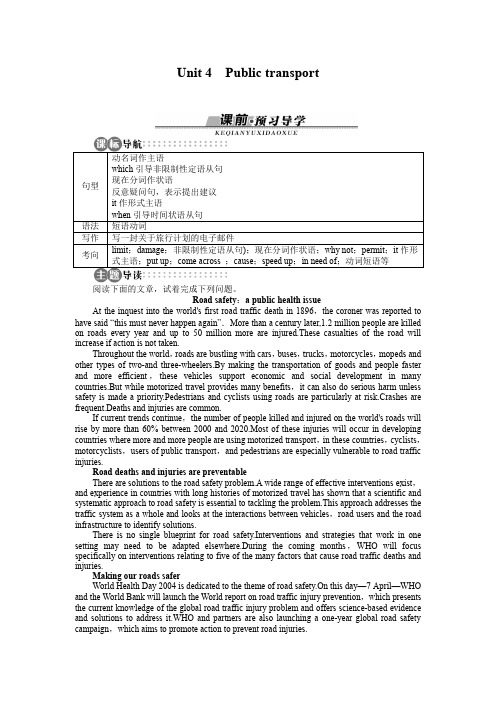
Unit 4 Public transport句型 动名词作主语which 引导非限制性定语从句现在分词作状语反意疑问句,表示提出建议it 作形式主语when 引导时间状语从句语法 短语动词写作 写一封关于旅行计划的电子邮件考向limit ;damage ;非限制性定语从句);现在分词作状语;why not ;permit ;it 作形式主语;put up ;come across ;cause ;speed up ;in need of ;动词短语等 阅读下面的文章,试着完成下列问题。
Road safety :a public health issueAt the inquest into the world's first road traffic death in 1896,the coroner was reported to have said “this must never happen again”.More than a century later,1.2 million people are killed on roads every year and up to 50 million more are injured.These casualties of the road will increase if action is not taken.Throughout the world ,roads are bustling with cars ,buses ,trucks ,motorcycles ,mopeds and other types of two-and three-wheelers.By making the transportation of goods and people faster and more efficient ,these vehicles support economic and social development in many countries.But while motorized travel provides many benefits ,it can also do serious harm unless safety is made a priority.Pedestrians and cyclists using roads are particularly at risk.Crashes are frequent.Deaths and injuries are common.If current trends continue ,the number of people killed and injured on the world's roads will rise by more than 60% between 2000 and 2020.Most of these injuries will occur in developing countries where more and more people are using motorized transport ,in these countries ,cyclists ,motorcyclists ,users of public transport ,and pedestrians are especially vulnerable to road traffic injuries.Road deaths and injuries are preventableThere are solutions to the road safety problem.A wide range of effective interventions exist ,and experience in countries with long histories of motorized travel has shown that a scientific and systematic approach to road safety is essential to tackling the problem.This approach addresses the traffic system as a whole and looks at the interactions between vehicles ,road users and the road infrastructure to identify solutions.There is no single blueprint for road safety.Interventions and strategies that work in one setting may need to be adapted elsewhere.During the coming months ,WHO will focus specifically on interventions relating to five of the many factors that cause road traffic deaths and injuries.Making our roads saferWorld Health Day 2004 is dedicated to the theme of road safety.On this day —7 April —WHO and the World Bank will launch the World report on road traffic injury prevention ,which presents the current knowledge of the global road traffic injury problem and offers science-based evidence and solutions to address it.WHO and partners are also launching a one-year global road safety campaign ,which aims to promote action to prevent road injuries.The loss and suffering associated with road traffic deaths and injuries are preventable.With firm political will and an integrated approach that addresses vehicles,the people who use roads,and the road infrastructure,roads can be made safer.Questions:1.How many people are killed on roads every year now according to the text?2.How can people prevent road traffic deaths and injuries?Keys:1.1.2 million people (are killed on roads every year).2.With firm political will and an integrated approach that addresses vehicles,the people who use roads,and the road infrastructure,roads can be made safer.诱思探究Do you know any effective approach that can make our roads safer?一、词汇拓展1.__________adv.遗憾地,不幸地→__________ adv.幸运地→__________ adj.幸运的2.__________ adj.难以置信的→__________adj.可信的→ __________ v.相信,认为→__________ n.相信,信赖,信念3.________ v.承担,从事→________ n.承担者,承办人4.__________n.所有权,产权→__________ n.主人→__________ v.拥有,adj.自己的5.__________ v.扩大,扩展→__________ adj.大的,多数的6.__________ n.周年纪念日→__________ adj.每年的,一年一次的7.__________ n.增加,增长→__________ v.种植,生长8.__________ n.询问,咨询→__________ v.询问,调查9.__________ n.少量的人或物;一把的量→__________n.手,vt.传递10.__________v.分割,分开→__________ (过去分词)11.__________n.接待员→__________ n.接待,接收→__________ v.接待;收到12.__________ n.预定,预约→__________ v.预约,储备,保留13.__________n.离开,出发→__________ v.离开,出发14.__________ adj.好斗的,挑衅的→__________v.侵犯,挑衅15.________ adj.喝醉的,n.醉汉→________ v.喝酒,喝二、短语互译1.set a limit/limits on ____________2.under the authority of ____________3.add up to ____________4.by means of ____________5.be experienced in ____________6.a handful of ____________7.by hand ____________8.put off ____________9.put up with ____________10.come up ____________11.come across ____________12.for pleasure ____________13.without delay ____________14.on the increase ____________15.at full speed ____________16.in favour of ____________17.in need(of) ____________三、重点句型1.However,most trains to London only went to the outer city limits,because __________ __________ __________ __________ __________ __________ would have damaged many oldbuildings.然而,大部分通往伦敦的火车只到外伦敦的边界,因为在市区修建铁路会损坏许多古建筑。
(牛津译林版选修7)2020高二英语Unit4 Public transport SectionⅡ Welcome to the unit教学案课件
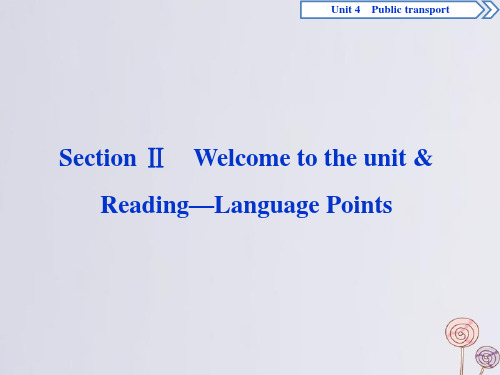
③The doctors believe that this illness __i_s_l_in_k_e_d__t_o__ the use of chemical pesticides. 医生认为这种病和使用化学杀虫剂有关。 ④You can link your PC _w__it_h_ our network via modem. 你可以通过调制解调器把你的个人电脑和我们的网络连接起 来。 ⑤For centuries farmers have linked the behavior of animals _t_o_ changes in the weather. 几个世纪以来,农民一直把动物 行为与天气变化联系在一起。
[巧学活用]——单句语法填空/单句改错 (1)He just now undertook _t_o_r_e_t_u_r_n__ (return) the book to me next Monday, which I lent to him several months ago. (2)The school leaders undertaken that they would accept any student regardless of their background. u_n_d_e_r_t_a_k_en_→ __u_n_d_e_r_t_o_ok
drop back (to) drop behind drop in/by (on sb.) drop out
退后,后撤(到) 落伍,落在……之后 顺便走访(某人) 退出;隐退;辍学
①Is it OK if I drop the papers off to you later? 我晚点把文件交给你行吗? ②It was once a time when I had no interest in study and wanted to drop _o_u_t_ of school. 曾经有一段时期我没有兴趣学习, 想辍学。 ③Economic growth will drop back _t_o_ 7% this year. 经济增长率今年将下降到 7%。 ④Why not _d_r_o_p__b_y_ for coffee sometime? 为什么不找个时间到我家喝杯咖啡?
高二英语选修7 Unit4教案
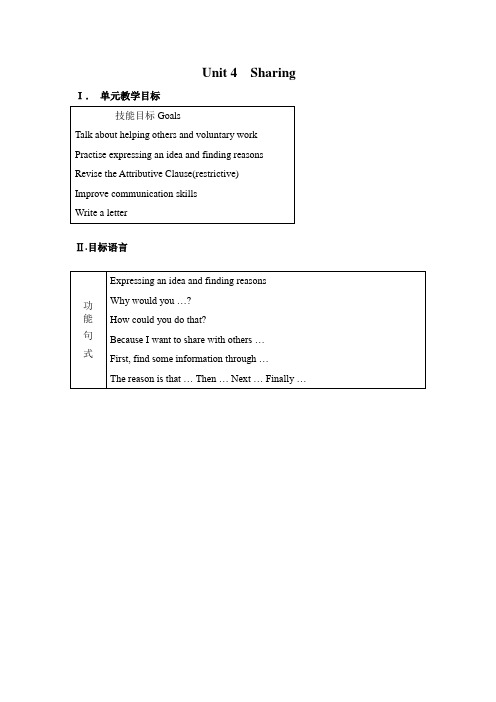
Unit 4 Sharing I.单元教学目标Ⅱ.目标语言III. 教材分析与教材重组1. 教材分析本单元以Sharing为话题,旨在通过单元教学,使学生了解世界上很多地方依然很落后,从而懂得同情,学会分享。
结合针对短文话题的探讨激发学生的国际意识,通过各种渠道力所能及地为贫困地区的孩子做出自己贡献。
1. 1 WARMING UP 提供了三项任务。
通过完成这些任务让学生懂得什么是“帮助”,并且反思自己是否乐于助人,以及怎样做才是“志愿者”,由此为后面的短文学习做好铺垫。
1. 2 PRE-READING是READING的热身活动。
其中介绍了短文主人公Jo,还根据她在PNG拍的照片提出了5个问题,使学生在阅读之前就简单了解短文内容。
1. 3 READING是一篇Jo写给Rosemary的信。
其中介绍Jo在PNG(Papua New Guinea)的所见所闻,使学生感受到PNG的儿童生活艰难,从而珍惜自己的学习机会。
.1. 4 COMPREHENDING 是根据短文设计的阅读理解试题。
1. 5 LEARNING ABOUT LANGUAGE分词汇和语法两部分。
其中,第一部分是有关此篇短文中的重点单词和短语;第二部分是有关限定性定语从句的复习。
1. 6 USING LANGUAGE是对READING的延伸。
通过阅读,参与“Give an unusual gift”的活动。
1. 7 LISTENING AND SPEAKING通过Jennifer Wells的采访介绍了Mary Murray作为MSF的一个volunteer的工作经历,而且针对这一话题展开Speaking。
1. 8 WRITING 根据LISTENING AND SPEAKING话题运用时间表达方式进行写作。
2. 教材重组2.1 从话题内容和训练目的上分析,WARMING UP与LISTENING AND SPEAKING相一致;从教材份量来说,可将WARMING UP与LISTENING AND SPEAKING的1、2、3、4项和Workbook中的LISTENING以及LISTENING TASK整合在一起,设计成一节任务型“听力课”。
选修7Unit_4__Sharing_学案

Unit 4 Sharing教材分析本单元的中心话题是济贫扶弱、志愿服务、合作共享。
教学目的是让学生认识到社会上贫富、强弱的差异和帮助别人的意义,帮助学生树立同情弱者、救困济贫的思想。
学案一W arming Up, Pre-reading and comprehendingTeaching Goals:1.help students understand the meaning of “volunteer activities, showing love activities and sharing”. (帮助学生理解“志愿者活动,献爱心活动,合作共享”等的意义。
)2. develop students to help others who are very poor or have some difficulties in daily life. (培养学生在日常生活中帮助他人,扶贫救困的爱心。
)3. help students develop right values.(帮助学生树立正确的价值观)Step 1. W arming Up1. Lead Ss to the content of this unit.2. Ask Ss to discuss the following question.In what ways do we help the people around?3. Divide Ss into groups and ask them to discuss the following question.Can we call the person who helps others a “volunteer”?Step 2. Pre-readingTeaching aims: To get Ss prepared for the reading text.1.Ask Ss to look at the pictures on P29~P302.do pre-reading exercise on P28.3. Lead Ss to the reading text.”Step 3 homework: 做双语报第31期b1版的主题阅读ReadingTeaching aims:.1. To train the students’ reading ability2.Grasp some important phrases and sentencesStep 1: skimmingSkim and try to divide it into four parts, and summarize what each part is about.Part 1 ( Paragraph 1) : ——————————————————————————————————Part 2 (Paragraph 2-3): ——————————————————————————————————Part 3(Paragraph 4-8): ——————————————————————————————————Part 4 (Paragraph 9) __________________________________________________ Step 2:scanning fill in the following blanks.1. ___ is a young Australian woman.2. ________ was dying to hear all about Jo’s life in Papua New Guinea.3. _______ walked a long way to get to the school.4._______________ didn’t have any textbooks.5. _____became a lot more imaginative when teaching.6. _________ started jumping out the windows during a chemistry experiment.7. _________ visited a village that was the home of one of the boys, Tombe.8. ________ started crying “ieee ieee” to welcome them.9. _________ led us to a low bamboo hut.10.________ was going to share the platform with Jenny and Jo.11. _________ softly talked to each other in their language Jo didn’t understandTrue or force1.The classrooms are made from bricks and the roofs from grass.( )2. It always takes the boys only a few minutes to get to the school.( )3. Science is the most challenging subject for Jo.( )4. When Jo and Jean arrived at the village, they shook hands with all the villagers.( )5. Tombe threw out the tin can because it’s very dirty.( )Step 3 Summary : According to Jo’s school conditions and the local village’s life and customs, fill in the blanks. High school-Jo’s school is a ____ school whose classrooms are made of _____ and roofs of ____. There is no _______ or ____, even no ______. Without ______, the students have no ______of doing experiment. Mostof the students will be going back to their villages after _____.Local village- Tombe comes from a _____ village where people speak special language. People live in the hut which has no _____ and the doorway was _____. The main food they eat are ______, _____ and _____. Villagers believe that _______ attract evil spirit in the night.Step 4. Homework: Read the text loudly and find some difficult sentences.学生可以选做双语报B1版的课文理解部分。
译林牛津版高二英语选修7下学期Unit4 Public Transport教案 下学期

模块七高二下学期Unit 4 Public TransportWelcome to the unit1. transport: vt . 1. 输送,运送,运输(货物,人等)Transport is an important part of out lives.交通运输是我们生活的重要组成部分.That yellow bus transports passengers from airport to the city.那辆黄色公共汽车将乘客从机场运送到城里。
The goods were transported by plane.那些物品是用飞机运输的。
2. (常用被动语态) 使万分激动be ~ed with joy/anger喜不自胜/怒不可遏3. 使进入特定境地The film ~d us back to NY of th e1950s.n. 1. 运输, 搬运, inland water ~ 内河运输; a ~ network 运输网; ~ charges 运输费through ~ by land and water 经水陆联运2. 运输工具, 运输船/飞机激动, 狂喜be in a ~ of rage 大发雷霆be in a ~ (s) of delight喜不自胜相关链接:1). 美国用transportation ; 英国用transport2). transport cafe(英)公路廉价餐厅2. pick up 和drop off课本原句:Buses have routes. They pick up and drop off people at different places on the route.公共汽车在不同的地方搭客或让客人下车.1). pick up: vt. 捡起;用车接……;获得,学到,得到;好转,改进;使重新开始,继续;接受节目;课文中意为用车、船等搭载客人,驾车出去迎接等.注[可分开用pick ……up]补充例句:I am busy today, so I will ask Tom to pick you up at the station?我今天忙,我将让汤姆去车站接你.相关链接:pick up①基本意:[vt.] (可分开用)拾起;采取例句:I told you the news that I picked up a coin on the road.我告诉你个好消息我在路上拾到一枚硬币。
高中英语人教版选修七教案:Unit+4单元教案

Unit 4 SharingI.教学内容分析本单元的中心话题是济贫扶弱、志愿服务、合作共享。
教学目的是让学生认识到社会上贫富、强弱的差异和帮助别人的意义,帮助学生树立同情弱者、救困济贫的思想。
Warming Up部分通过对同学进行采访的小组活动,了解同学们平时帮助别人的方式。
最后讨论自愿帮助和志愿者的不同,从而引出下文的阅读课文。
Pre-reading部分介绍了阅读课文的背景知识。
Reading部分是一封家书。
作者是一个到巴布亚新几内亚教书的志愿者。
文中介绍了巴布亚新几内亚农村的教育和生活状况,描述了到一个学生家做客的经历。
Comprehending部分设置了三个练习,目的在于让学生逐层加深对课文的理解。
Learning about Language部分突出了词汇和语法的学习与训练。
本单元的语法是复习限制性定语从句,特别是用that不用which的情况。
Using Language部分中包括了听、读、写三个部分的内容。
阅读部分介绍了一个出售特殊礼物、帮助发展中国家的网页。
听力部分通过记者对一个志愿者的采访,让学生更多地了解发展中国家,培养学生助人为乐的精神。
学习用时间表达法叙述事件是本听力练习的重点。
Summing Up部分要求学生对本单元所学的知识进行总结和评价,以找出不足之处,从而改进。
Learning Tip部分建议学生要积极参加小组活动,以练习口语,培养交际能力。
II.教学重点和难点1. 教学重点(1) 本单元的生词和短语;(2) 系统掌握运用限制性定语从句。
2. 教学难点(1) 认识帮助别人的重要性;(2) 学会发表评论和表达自己的看法;(3) 学会以时间为线索,叙述人物生平。
III.教学计划本单元建议分六课时:第一课时:Warming up, Pre-reading, Reading & Comprehending第二、三课时:Learning about Language第四课时:Reading and discussing (Using Language)第五课时:Listening and speaking (Using Language)第六课时:Reading task (Workbook), Speaking task (Workbook) & Writing task(Workbook)IV.教学步骤:Period 1 Warming up, Pre-reading, Reading & ComprehendingTeaching Goals:1. To help Ss to learn the importance of helping others and the ways to help others.2. To help Ss to learn about the educational and living conditions of some developing countries and develop their awareness of helping those in need.3. To teach how to use the new words and phrases in the text.Teaching Procedures:Step 1. Leading-in1. Lead Ss to the content of this unit. Teacher may say, “We have all heard about Lei Feng, who was ready to help others and set us an example. We live our own lives. Everybody has his own work to do. Why must we help others?”2. Get some Ss to present their opinions on the question above before the class.Suggested Answer:Nobody can do everything alone, no matter how powerful he is. Nobody never meets with trouble, no matter how well he is going. So everybody needs others’ help. But we cannot alwaysreceive but never give. We must give in return for what we receive. We give help because we have been helped. Since we were born, we have received a lot from the society. So we should return it. We give help today, but we may need help tomorrow. Even if we may not see a person again, by helping him, we can let him know help is necessary and important for those who are in need. By helping each other, people can feel that life is full of warmth and friendliness and is worth living. In a word, to help others is to help oneself.Step 2. Warming Up1. Ask Ss to discuss the following question.In what ways do we help the people around?2. Ask Ss to work in groups of four and one of them to interview the other three. Tell him to ask the questions in Ex1 of Warming Up on P28. Then get one pair to act out their dialogues before the class.3. Divide Ss into four groups and ask them to discuss the following question.Can we call the person who helps others a “volunteer”?Suggested Answer:When one of your parents or friends needs help, you may not be asked to help but you volunteer to help, we don’t say you are a volunteer. A volunteer is a person who helps others in or outside his community or in a foreign country.Step 3. Pre-readingPurpose: To get Ss prepared for the reading text.1.Ask Ss to look at the pictures on P29~P30 and guess what the passage talks about.2.Ask Ss to describe the students and their classrooms in the pictures. After that, let Ss imaginetheir living conditions.3. Lead Ss to the reading text. Teacher may say, “Today we are going to read a letter written by an Australian volunteer, Jo, who taught for two years in Papua New Guinea, a country to the south of Australia.”Step 4. SkimmingPurpose: To help Ss get the general idea of the letter.1.Ask Ss to listen to the tape and try to get the main idea of the text.Suggested Answer:In the letter, the writer wrote about the educational and living conditions in PNG and her experience of visiting a student’s village.2.Play the tape paragraph by paragraph and let Ss read after it. Then ask them to sum up themain idea of each paragraph with only one sentence.Suggested Answer:Para.2: The school is simply built and far away from the students’ homes.Para.3: The educational conditions are very poor.Para.4: I visited a village of one of my student’ and received a warm welcome.Para.5: I stayed with the student’s family and their huts were poorly equipped.Para.6: I had a meal with the student’s family and they cooked in an unusual way.Para.7: I returned from the visit and felt greatly rewarded.Step 5. ScanningPurpose: To help Ss get a deeper understanding of the text..1. Ask Ss to find out the relationship of the people mentioned in the text. Teacher may say, “There are some persons mentioned in the text. Can you name them? Can you find out who they are?” Suggested Answers:Jo — the writer of the letter.Rosemary — the person who Jo is writing to.Tombe — one of the writer’s boy students, whose family Jo visitedJenny — the writer’s fellow workerKiak — Tombe’s motherMukap — Tombe’s father2. Ask Ss to read the text carefully and ask them the following questions. It is better to read them out to Ss than to present them on the blackboard. Encourage Ss to keep the eyes away from the books when they answer the questions.(1)What is the school like?(2)Is the writer popular with her students? How do you know?(3)What is the writer’s difficulty in teaching?(4)Why did the students jump out of the windows?(5)Why does the writer wonder if she is making any difference to her students’ lives?(6)Was the writer warmly welcomed by the villagers? How do you know?(7)Do Mukap and Kiak usually sleep in the same house?(8)Where did the writer and Jenny sleep that night?(9)Why did Tombe throw away the tin can?Suggested Answers:(1)It is made of bamboo and the roofs are made of grass. It is from away from Ss’ homes.(2)Yes. When she gets to school, the students all say hello to her.(3)There is no electricity or water and they have no textbooks. There is no teachingequipment.(4)Because they had never seen such an accident and were frightened.(5)Because most of her students will go back to their villages to work in the field and shethought what they have learnt will be of no use.(6)Yes. Because Tmbe’s mother welcomed her by crying “ieee ieee” and the villager allshook hands with her warmly.(7)No. They sleep in their own huts.(8)They slept on a newly-made platform in Mukap’s hut.(9)Because they think throwing away the tin can is in fact throwing away evil spirits.Step 6. Language point1. Ask Ss to work in pairs and underline and translate the following phrases in the text.hear from, be dying to do sth., up to, adapt to, the other day, before I knew it, come across, make a difference to sb., get to know, shake hands with sb., stick out of, get through, a newly made platform, a couple of, build a fire, leave…to do sth., dry out, dry up, fall into bed2. Lead Ss to deal with some more language points.(1) be dying to do sth (line 2, para1): want very much to do sth, have a strong desire to do sth.I am dying to know what has happened. 我迫切想知道发生了什么。
高二英语译林版选修7学案:Unit4PublictransportSectionⅡ含解析
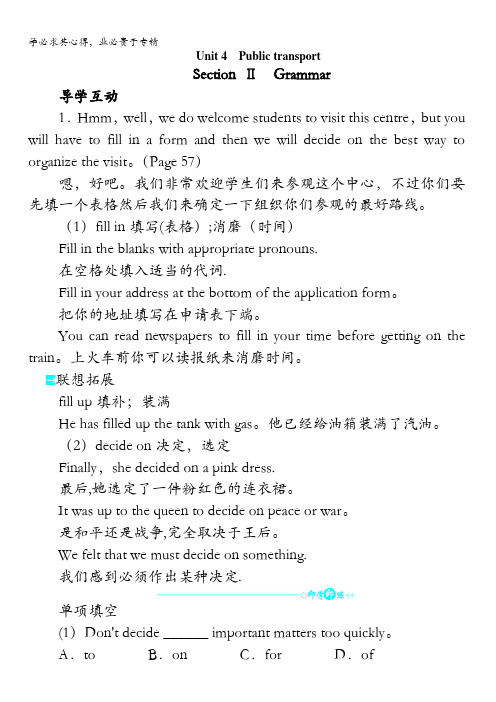
Unit 4Public transportSection ⅡGrammar导学互动1.Hmm,well,we do welcome students to visit this centre,but you will have to fill in a form and then we will decide on the best way to organize the visit。
(Page 57)嗯,好吧。
我们非常欢迎学生们来参观这个中心,不过你们要先填一个表格然后我们来确定一下组织你们参观的最好路线。
(1)fill in填写(表格);消磨(时间)Fill in the blanks with appropriate pronouns.在空格处填入适当的代词.Fill in your address at the bottom of the application form。
把你的地址填写在申请表下端。
You can read newspapers to fill in your time before getting on the train。
上火车前你可以读报纸来消磨时间。
联想拓展fill up填补;装满He has filled up the tank with gas。
他已经给油箱装满了汽油。
(2)decide on决定,选定Finally,she decided on a pink dress.最后,她选定了一件粉红色的连衣裙。
It was up to the queen to decide on peace or war。
是和平还是战争,完全取决于王后。
We felt that we must decide on something.我们感到必须作出某种决定.单项填空(1)Don't decide ______ important matters too quickly。
高中英语语法课教案全英文
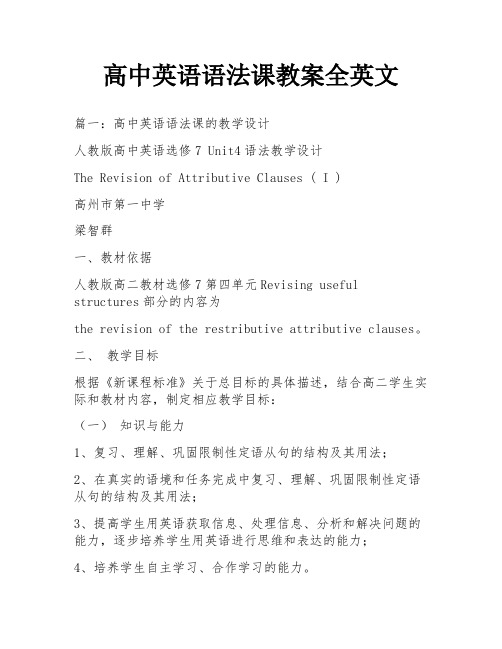
高中英语语法课教案全英文篇一:高中英语语法课的教学设计人教版高中英语选修7 Unit4语法教学设计The Revision of Attributive Clauses ( I )高州市第一中学梁智群一、教材依据人教版高二教材选修7第四单元Revising useful structures部分的内容为the revision of the restributive attributive clauses。
二、教学目标根据《新课程标准》关于总目标的具体描述,结合高二学生实际和教材内容,制定相应教学目标:(一)知识与能力1、复习、理解、巩固限制性定语从句的结构及其用法;2、在真实的语境和任务完成中复习、理解、巩固限制性定语从句的结构及其用法;3、提高学生用英语获取信息、处理信息、分析和解决问题的能力,逐步培养学生用英语进行思维和表达的能力;4、培养学生自主学习、合作学习的能力。
(二)过程与方法1、采用“任务型”语言教学。
根据不同的语法内容设计不同的任务,让学生通过完成任务,在语言运用中去学习、掌握语言形式和语言规则,使学生在做中学,在做中练,在做中巩固。
2、利用真实的环境或设计模拟的情境进行语法教学,使语法教学更趋形象化、直观化、真实化和趣味化。
情景活动中的学习降低了语法学习的难度,激发了学生学习英语的积极性,使他们学得快,记得牢,用得活。
3、把某些语法教学转化为交际活动,具体设计有:(1)英文歌式通过画出英文歌中的restributive attributive clauses,使教学内容生动形象,不仅调动学生的学习兴趣,而且营造良好的课堂氛围。
(2)游戏式根据教学内容设计“接龙”游戏及猜谜游戏。
在这样的操练活动中,学生既锻炼了思维能力与快速反应能力,又加深了对所学语法现象的理解,同时使语法教学既轻松又有效。
(3)讨论式设计一些练习,让学生与同桌或小组同学相互讨论学习,激发学生学习的兴趣,增强学生对英语语言信息的使用和接受能力。
高中英语教案unit 4 Sharing 新人教版选修7

新课标人教版 Unit 4 Sharing 共享核心词汇1.Everyone in the class is expected to ____________(参加)in the discussion,all included.2.Foreign investors are not permitted to____________(购买)land.3.Clothes and blankets have been_____________(分配,分发) among the flood victims. 4.I’m afraid that either of them will not agree to this ____________(安排).5.She often tells her classmates how hard life is at the____________(偏僻的)school. 6.Some old workers enjoy certain____________(特权),such as company cars and private health care in our company.7.It is hoped that education should be____________(有关的)to children’s needs.8.In my opinion,these are____________(政治)rather than social matters.9.The desks and chairs are____________,and you can_____________them to the height of the students.The ____________is not difficult to make.(adjust)10.The schoolbus was ____________to them by a motor company and they received ____________from other companies as well.(donate)1.participate2.purchase3.distributed4.arrangement5.remote6.privileges7.relevant8.political9.adjustable;adjust;adjustment 10.donated;donations 高频短语1.________________ 接到……的信2.________________ 极想;渴望3.________________ 不久前的一天4.________________ 和……有关5.________________ 参与……;参加……6.________________ (使浸水等物)完全变干;干透7.________________ (指河流、井等)干涸8.________________ 在困难中;在危急中9.________________ 完成;穿过10.________________ 伸出11.________________ 说实在的1.hear from2.(be)dying to3.the other day4.be relevant to...5.participate in6.dry out7.dry up8.in need9.get through 10.stick out 11.to be honest 重点句式1.We walked for two and a half hours to get there—first up a mountain to a ridge____________we had fantastic views and then down a steep path to the valley below.我们走了两个半小时才到了那儿。
人教版高中英语选修7优秀教案Unit4SharingPeriod 4新
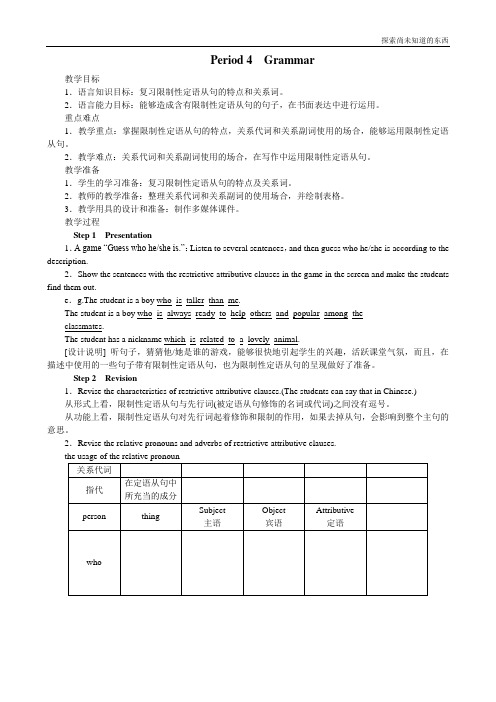
Period 4Grammar教学目标1.语言知识目标:复习限制性定语从句的特点和关系词。
2.语言能力目标:能够造成含有限制性定语从句的句子,在书面表达中进行运用。
重点难点1.教学重点:掌握限制性定语从句的特点,关系代词和关系副词使用的场合,能够运用限制性定语从句。
2.教学难点:关系代词和关系副词使用的场合,在写作中运用限制性定语从句。
教学准备1.学生的学习准备:复习限制性定语从句的特点及关系词。
2.教师的教学准备:整理关系代词和关系副词的使用场合,并绘制表格。
3.教学用具的设计和准备:制作多媒体课件。
教学过程Step 1Presentation1.A game “Guess who he/she is.”:Listen to several sentences,and then guess who he/she is according to the description.2.Show the sentences with the restrictive attributive clauses in the game in the screen and make the students find them out.e.g.The student is a boy who_is_taller_than_me.The student is a boy who_is_always_ready_to_help_others_and_popular_among_the_classmates.The student has a nickname which_is_related_to_a_lovely_animal.[设计说明] 听句子,猜猜他/她是谁的游戏,能够很快地引起学生的兴趣,活跃课堂气氛,而且,在描述中使用的一些句子带有限制性定语从句,也为限制性定语从句的呈现做好了准备。
Step 2Revision1.Revise the characteristics of restrictive attributive clauses.(The students can say that in Chinese.)从形式上看,限制性定语从句与先行词(被定语从句修饰的名词或代词)之间没有逗号。
人教版高中英语选修7云南省陇川县第一中学选修七Unit 4 Sharing 教案 语法 人教版

Teaching goals 教学目标1. Target language目标语言重点词汇和短语adjust, grill, relevant, doorway, privilege, arrangement, stick out, come across, hear from, platform, dying to2. Ability goals能力目标Learn about the useful words and expressions.Revise the restrictive attributive clause.3. Learning ability goals学能目标Help the students learn how to use the useful words and expressions.Help the students learn how the restrictive attributive clauses are used in the passage. Teaching important and difficult points教学重难点Revise the restrictive attributive clause.Teaching methods 教学方法Explaining and practicing.Teaching procedures & ways过程与方式Step ⅠGrammar reviewT: We have learned enough about the restrictive attributive clauses before. Let’s have a summary. Attributive clause is the clause that modifies a noun. That is, a sentence with an attributive clause is a combination of two shorter sentences. In an attributive clause, we must use conjunctions: Relative pronouns who / whom / which / whose / that. The most important part of attributive clauses is the connectors, namely the conjunctions that connect the two sentences, and they function in the clauses differently. Here are 11 sentences. Please underline the connectors and tell their functions in the clauses. Show the following sentences on the screen.1. The man who is now talking to our English teacher comes from America. (subject)2. Mary is the girl whom / who I just talked with. (object)3. This is the book which I like very much. (object)4. I want to buy a house which faces south. (subject)5. How I wish I could have the same car as you have. (object)6. Do you know the person that is wearing a red hat? (subject)7. I can’t read the book that you bought, because it is too difficult. (object)8. Yesterday I met Tom, whose father is a doctor. (attributive)9. Can you see the book whose cover is red?(attributive)10. Do you still remember the time when we lived in the countryside? (adverbial of time)11. They visited the house where comrade Zhou Enlai once lived and worked. (adverbial of place)Then let the students pay attention to some difficult points as follows.The use of “that”: sometimes “that” can’t be used, for example,a. They are boys with whom I went to school. (object, after preposition, “that” is not used)b. The case to which you are referring to is now closed. (object, after preposition, “that” is not used)c. I told the story to John, who later did it to his brother. (subject, non-restrictive attributive clause, “that” is not used)d. His speech, which bored everyone, went on and on. (subject, non-restrictive attributive clause, “that” is not used)But sometimes it must be used, for example,a. This is all that I want to say. (after: all, few, little, much, something, nothing, anything, everything, any, every, no, some, “that” must be used, if it is not the subject, “that” can be omitted.)b. I agree every point that he referred to just now. (“that” can be omitted)c. This is the most beautiful place that I have ever seen. (after superlatives or ordinal numerals, “that”can be omitted)d. This is the very book that I want to borrow. (after: the very, the only, the same,object, “that” can be omitted)e. They talked of things and persons that they remembered in the school. (after both person and thing, object, “that” can be omitted)The last important point is: where, when, that, etc. for example,a. This is the museum which / (that) we visited last week. (object)b. This is the museum where (in which) my father once worked. (adverbial)c. Do you still remember the days which / (that) we spent in the countryside? (object)d. Do you still remember the days when (during which) we worked in the countryside? (adverbial)e. The reason which / (that) he provided was not what we expected. (object)Then let the students finish Exercises 1-2 in Revising useful structures. Check the answers.Step II PractisingLet the students finish the exercises in USING WORDS AND EXPRESSIONS and USING STRUCTURES. If time is limited, they can finish them after class.Step Ⅴ HomeworkRemember the new words and expressions in this unit and make sentences with the following ones: adjust, relevant, arrangement, privilege, donate, otherwise, anniversary, stick out, hear from, dry out, dry up。
(完整版)名校高中英语选修7Unit4教学课件

There are many famous volunteers you know.Here
are some photos below
• Can you guess who they are?
Байду номын сангаас
Norman Bethune 白求恩
Mother Teresa 特蕾莎修女
She lived in India (1910-1997).She helped the poor and the sick and won the NOBEL PEACE PRIZE in 1979 .
group rather than singly
• 1 Children should be told to share their toys. • 2 We share the cost of the meal. • 3 We all share the responsibility for these • terrible events. • 4 It’s always better to share your worries and • problems.
Unit 4
Warming-up and Pre-reading
Give roses to others and the lasting fragrance will remain in your hand.
Ke Faxiang
Mar25,2012
share: to have, use, pay, or take part in something with others among a
»濮存昕
The image ambassador for HIV // Aids
译林版高中英语选修7优化教案 Unit 4 Section Ⅱ Welcome to the unit & Reading — Language points
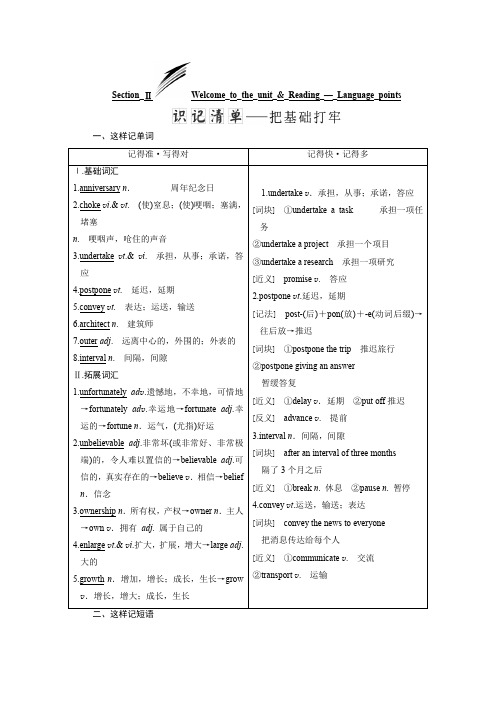
Section_ⅡWelcome_to_the_unit_&_Reading_—_Language_points一、这样记单词三、这样记句式1.(教材P49)They pick up and drop off people at different stops on the route.它们在沿途不同的站点接送乘客。
pick up开车接(某人);无意中学会;接收(节目、信号);买到某物(尤指廉价或运气好);改善,好转写出下列句中pick up的含义①Here's a tip I picked up from my mother.无意中学会②The bus picks up passengers outside the airport.开车接(某人)③We were able to pick up the BBC World Service.接收④We managed to pick up a few bargains at the auction.买到某物⑤Trade usually picks up in spring.好转drop off(1)下车,使(某人)下车;中途下客或卸货①Get the driver to drop you off at the railway station.告诉司机让你在火车站下车。
②You left your jacket, but I can drop it off on my way to work tomorrow.你忘了拿你的夹克衫,不过我可以在明天上班的路上顺便捎给你。
(2)打盹儿,小睡③I dropped_off and missed the end of the film.我打了个盹儿,错过了影片的结尾。
(3)减少④The number of students is dropping_off because of the low birth rate.由于出生率低,学生人数在下降。
精编教案--高二英语选修七教学设计unit4sharing
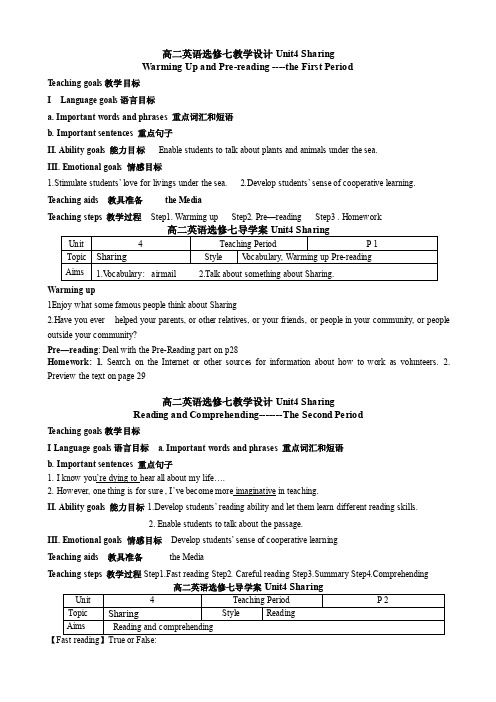
高二英语选修七教学设计Unit4 SharingW arming Up and Pre-reading ----the First PeriodT eaching goals教学目标I Language goals语言目标a. Important words and phrases 重点词汇和短语b. Important sentences 重点句子II. Ability goals 能力目标Enable students to talk about plants and animals under the sea.III. Emotional goals 情感目标1.Stimulate students’ love for livings under the sea.2.Develop students’ sense of cooperative learning.T eaching aids 教具准备the MediaT eaching steps 教学过程Step1. Warming up Step2. Pre—reading Step3 . HomeworkWarming up1Enjoy what some famous people think about Sharing2.Have you ever helped your parents, or other relatives, or your friends, or people in your community, or people outside your community?Pre—reading: Deal with the Pre-Reading part on p28Homework: 1. Search on the Internet or other sources for information about how to work as volunteers. 2. Preview the text on page 29高二英语选修七教学设计Unit4 SharingReading and Comprehending-------The Second PeriodT eaching goals教学目标I Language goals语言目标 a. Important words and phrases 重点词汇和短语b. Important sentences 重点句子1. I know you’re dying to hear all about my life….2. However, one thing is for sure , I’ve become more imaginative in teaching.II. Ability goals 能力目标1.Develop students’ reading ability and let them learn different reading skills.2. Enable students to talk about the passage.III. Emotional goals 情感目标Develop students’ sense of cooperative learningT eaching aids 教具准备the MediaT eaching steps 教学过程Step1.Fast reading Step2. Careful reading Step3.Summary prehending【Fast reading】True or False:1)The classrooms are made from bricks and the roofs from grass.2)It always takes the boys only a few minutes to get to the school.3)Science is the most challenging subject for Jo.4)When Jo and Jean arrived at the village, they shook hands with all the villagers.5)Tom be threw out the tin can because it’s very dir ty. (FFTTF)【Careful reading】l. Why does Jo call the school where he teaches a bush school?A. Because the school was built in a bush.B. Because the classrooms are made from bamboo and the roofs from grass.C. Because there is nothing but bushes around the school.D. Because students in that school use "bush" as their names.2. Which of the following statements is RIGHT?A. There is no electricity but enough water at school.B. I can become used to the school' s condition easily.C.The students there often do chemistry experiments.D.We have neither textbooks nor any experiment equipment.3. Which of the following sentences are RIGHT about Mukap' s house?a. It is a low bamboo hut with grass sticking out of the roof and this shows it' s a woman' s house.b. There were no windows and the doorway was just big enough to get through.c. The hut was dark inside so it took time for our eyes to adjust.d. Fresh grass had been laid on'the floor but there was an old platform.e. That night Kiak-aras going to share the platform with us.A. abeB. bcdC. bceD. cde4.What can you say about the village?The village was a place full of natural beauties. There are more trees and bamboos.5. What can you say about life in the village? People in the village lived a simple life.【Homework】高二英语选修七教学设计Unit4 SharingLanguage points ---The Third PeriodT eaching goals教学目标I Language goals语言目标a. Important words and phrases 重点词汇和短语b. Important sentences 重点句子1.I know you’re dying to hear all about my life….2. However, one thing is for sure , I’ve become more imaginative in teaching.3. Otherwise, they do n’t waste anything.II. Ability goals 能力目标1.Get students to use some useful new words and expressions correctly.2.Enable students to make sentences after the useful sentence patterns.III. Emotional goals 情感目标1.Stimulate students’ interest in learning English.2.Develope students’ spirit of cooperating and teamwork.T eaching aids 教具准备:the MediaT eaching steps教学过程Step1.Greetings Step2.Revision:vocabulary.Step3. Language points Step4. Exercises【词汇重现】Review words and expressions in unit4.【学习新知】见新新学案P45—P49知识点。
- 1、下载文档前请自行甄别文档内容的完整性,平台不提供额外的编辑、内容补充、找答案等附加服务。
- 2、"仅部分预览"的文档,不可在线预览部分如存在完整性等问题,可反馈申请退款(可完整预览的文档不适用该条件!)。
- 3、如文档侵犯您的权益,请联系客服反馈,我们会尽快为您处理(人工客服工作时间:9:00-18:30)。
Reading1◆词汇拓展1._________ n.泥,淤泥 ____________ adj.泥泞的,模糊的2.__________________富有想象力的,创新的 __________________可想象得到的___________________想象中的,虚构的3.week n.星期,周___________ adj.每周的; _________adv.每周;n.周报,周刊4.______________ adj. 有关的,切题的,中肯的_____________ n.关联,相关性________________ adj.无关的5.____________ v. 调整,适应,(使)适合_______________ adj. 可调整的_________________ n.调节,校正6._____________ vi.参与;参加→________________ n.参加,参与________________n.参与者7.________________ v.安排,筹备_____________________ n. 安排,商定,约定◆重要词组1.__________________接到……的信2. _______________________极想,渴望3.__________________直达,多达,高达4.________________________ 适应5.__________________不久前的一天6.__________________ 偶然遇到;碰见7.___________________对……有影响 8.________________________老实说9.___________________与某人握手 10.________________________伸出,突出11.___________________参加 12.______________________完全变干,干透13._________________ (指河流、井等)干涸◆课堂导析(Warming up and reading)1.(原句)Thanks for your letter. It was wonderful to hear from you. (Page 29)【拓展】hear from sb =receive one’s letter_____________ 听到关于......的消息 ______________ 听说, 听到________________. 听见某人做了某事 _________________ 听见某人正在做某事(1)________________________________________________我好久没得到他的音信了。
(2)___________________________________________________难道你没听说过John Denver吗?(3) ____________________________________________________她能听到外面有人在唱歌。
(4) _____________________________________________________我听到他把电视打开了。
2. (原句)I know you’re dying to hear all about my life here.(P 29)我知道你极想听到我在这儿的生活。
【拓展】be dying/ be eager/be anxious to do渴望做某事be dying /be eager/be anxious/thirsty for迫切想得到某物____________ 因…而死 ____________ (动.植物)灭绝;(风俗,习惯等)消失____________ (家庭,种族等)相继死亡 ___________ (声音,光线)逐渐平息,减弱_____________ (火,兴奋)渐弱,渐息(1)The country is changing very quickly and many of the old traditions are_____A.dying ofB.dying awayC. dying downD.dying out(2)All the children on the playground stared up into the sky until the noise of the plane______.A.gave upB. took offC.went offD. died away(3)__________________________________________________学生迫不及待地想知道结果。
(4) ___________________________________________________她渴望一台电脑。
3. (原句)The other day I was showing the boys the weekly chemistry experiment when, before I knew it, the mixture was bubbling over everywhere! (P 29)be doing…when…正在做……这时……be about to do …when…正要去做……就在那时……had just done…when…刚做完……就在那时……It was/wasn’t +时间+before…过了不久就It will be +时间+before………之后才……(1)We haven’t met each other for almost thirty years. Much to my surprise, I heard from him_____.A.these daysB.some dayC.to this dayD.the other day(2)___________________________________________________________________他正在写作业这时妈妈回来了。
(3)_________________________________________________________________我正要去睡觉就在这时电话响了。
(4)________________________________________________________三年后我们会再见面。
(5)_________________________________________________ 我到这儿前他就已经离开了。
(6)_________________________________________________没过多久消防队员就到达了。
4. (原句)Sometimes I wonder how relevant chemistry is to these students…(P 29) 【拓展】________________________ 与……有关的= be connected with/have sth to do with be irrelevant to 与……无关的 have no relevance to 与……无关(1)这一点至关重要,我们还是接着谈吧。
This point is really ______________ and we had better move on.(2)她的陈述与这件事无关。
Her statement_____ ____________ ______ this case.5. (原句)But last weekend another teacher, Jenny, and I did visit a village which is the home of one of the boys, Tombe. (Page 29) 但是上周末, 另一位老师Jenny 和我拜访了一个村子, 这个村子是其中一个男孩Tombe的家。
did 强调肯定语气, 只用于一般现在时或一般过去时,有do ,does, did三种形式。
(1)The little girl _______ want to see her mother. 这个女孩非常想见她的母亲。
(2) I______ like to eat apples. 我的确喜欢吃苹果。
(3)You_______ lose your temper but it doesn’t matter.你的确发脾气了,但不要紧。
6 . (原句)The hut was dark inside so it took time for our eyes to adjust.小屋内很黑,因此眼睛要过好一阵才能适应过来。
(P 30)【拓展】adjust vi.& vt. 调整;使适合adjust sth. (to sth.) 调整(以适应/适合……) adjust to (doing) sth. 适应(做)某事____________________使自己适应…… _______________________ 作出调整,作出调节(1) 你可以通过按这个按钮来调节电视的色彩。
You can _______ ____ ________ on the TV by pressing the button.(2) 他很快就使自己适应了这个国家的炎热气候。
He ___________ ______ _______ ________ ______ the heat of the country.(3) 我们对计划做了些小的调整。
We made a few minor ______________ (adjust) to the plan.(4)她花了很长时间才适应了在美国独自生活。
_________________________________________________________________(5)动物能使自己适应生存环境。
________________________________________________________________7. (原句)I loved listening to the family softly talking to each other in their language,even though I could not participate in the conversation. (P30)我喜欢听一家人用他们的语言轻声细语地交谈,虽然我无法参与到他们的对话中去。
